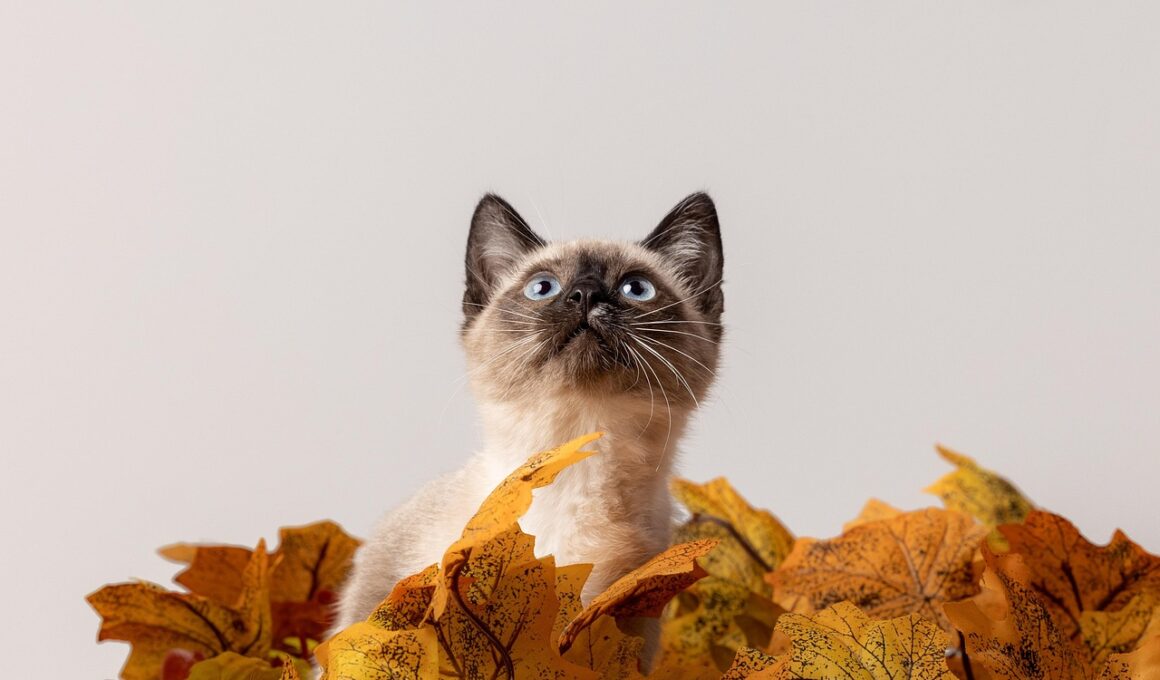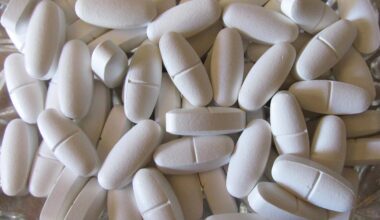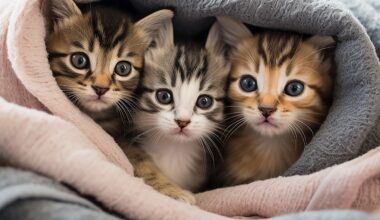Signs of Nutritional Deficiencies in Rescued Cats
When rescuing cats, understanding nutrition is vital for their well-being. Nutritional deficiencies can lead to a variety of health issues, and recognizing signs is crucial for timely intervention. Common symptoms of nutritional deficiencies include lethargy, poor coat condition, and noticeable weight changes. Cats might become less active, losing interest in play or once-enjoyable activities, making it vital for caregivers to monitor signs carefully. Additionally, a poor coat could indicate a lack of essential fatty acids, vitamins, or minerals. To maintain healthy fur, a balanced diet is essential. Weight changes, whether loss or gain, can reflect inadequate nutrient intake or an excessive calorie count. Consulting a veterinarian is highly advisable for those concerned about their rescued cats’ diets. A professional can recommend suitable cat food, ensuring vitamins, proteins, and minerals are present. Regular assessments of body condition scores can significantly aid in evaluating a cat’s nutritional status. This proactive approach enables caregivers to make necessary dietary adjustments, resulting in healthier, happier animals.
Another sign of nutritional deficiencies in rescued cats involves dental health. Cats often experience gum diseases due to nutrient deficiencies, resulting in bad breath and difficulty eating. These issues can develop from lack of proper nutrients, such as calcium or phosphorus, which are critical for dental maintenance. Regular checks of your cat’s mouth can help identify early signs of dental disease. If you notice excessive tartar buildup, swollen or bleeding gums, or if your cat appears to be in pain while eating, consult with a veterinarian. A change in diet, along with specific dental cat foods, can improve these conditions. Furthermore, a lack of essential amino acids can lead to a reliance on unhealthy, high-carbohydrate foods, creating further complications. Implementing a proper diet rich in necessary nutrients assures optimal dental and overall health. Keeping your rescued feline’s teeth clean and their diet balanced is crucial for longevity. Awareness of these signs promotes not only overall well-being but also quality of life for your rescued friend. As always, early detection can lead to better outcomes, so keep an eye out for these indicators.
Behavioral Changes as Indicators
Behavioral changes can serve as critical indicators of nutritional deficiencies among rescued cats. When cats aren’t getting enough essential nutrients, they may exhibit unusual behaviors such as aggression or anxiousness. These behaviors stem from discomfort or malnutrition. A change in eating habits, refusing food, or eating excessively are also signs of underlying nutritional issues. Cats showing an increase in vocalization or hiding more frequently might be experiencing discomfort from an unbalanced diet. Owners should be observant of any shifts in their feline friend’s mood or energy levels. Additionally, sudden changes in hydration or litter box habits may signal dietary deficiencies. In particular, changes in urine volume or odor can reflect hydration levels influenced by diet. Owners should monitor their cat’s water intake and overall thirst, ensuring that their diet supports healthy hydration levels. If any of these signs persist, it’s critical to consult with a veterinarian for a tailored diet plan, which can rectify the deficiencies. A balanced diet not only enhances physical health but also promotes emotional well-being.
Moreover, skin issues often arise due to nutritional deficiencies in rescued cats. A lack of essential nutrients can manifest as dry, flaky skin, leading to itchiness and discomfort. Such symptoms can drive cats to excessive grooming, which might result in hair loss or even skin lesions. Essential fatty acids are crucial for maintaining skin health, and their absence can cause dermatological problems. It’s important to include proper cat food containing omega-3 and omega-6 fatty acids in your rescued cat’s diet to alleviate these issues. Consulting veterinarians can additionally ensure that you’re providing a high-quality diet essential for recovering skin health. Vitamins A and E can also contribute to skin wellness and should be monitored closely. Observations of skin and coat conditions will reflect the effectiveness of dietary changes implemented. Don’t discount the significance of proper nutrition for healthy skin and a vibrant coat; it plays a pivotal role in your cat’s self-esteem and overall comfort. Therefore, regular check-ups with a veterinarian can further assist in fine-tuning your cat’s diet for optimum health and recovery.
Weight Management and Nutritional Needs
Weight management is vital in ensuring that rescued cats receive the proper nutrition essential for recovery. Obesity and being underweight both highlight nutritional imbalances, potentially stemming from improper diet or lack of research. Obese cats may seem lazy and sluggish, while underweight cats may exhibit frailty and lethargy. This makes monitoring body condition crucial. A manageable feeding schedule promotes healthy weight adjustments while accommodating varying dietary needs. Choosing a high-quality cat food tailored for specific life stages or health conditions can work wonders. Nutrient-dense options loaded with proteins and fibers help cats attain their ideal weight without compromising energy levels. Transitioning from rescue food to a balanced adult diet should occur gradually to minimize shock to the cat’s digestive system. Regular weigh-ins will also highlight progress in weight management, encouraging you to make timely adjustments. Remember that emotional factors can influence feeding habits, so creating a consistent and calm feeding routine can help alleviate these issues. Seeking guidance from veterinarians can prove beneficial for personalized diets, enhancing your rescue’s health while preventing future complications.
In conclusion, addressing nutritional deficiencies in rescued cats is essential for their overall well-being. Recognizing the signs of malnutrition, including changes in behavior, dental problems, and weight management issues, empowers caregivers to take appropriate action. A proactive approach enables prompt interventions to rectify any imbalance in their diets. Regular vet visits ensure that cats receive personalized dietary recommendations, promoting better health outcomes. Monitoring the quality of cat food provided, emphasizing high-quality options rich in essential nutrients, substantially contributes to recovery and resilience. Furthermore, understanding the specific needs of rescued cats—whether they require weight management or addressing skin issues—is paramount. Continually observing your feline friend will help you identify any problems early, reducing long-term health risks. As a responsible and caring cat owner, your decisions significantly affect their health trajectory. By maintaining a balanced diet and being aware of the signs of nutritional deficiencies, you are setting up the best possible outcomes for your cherished rescue. Ultimately, nutrition is foundational in building a lifelong bond with your feline companion, enhancing the quality of life together.
Final Thoughts on Nutritional Care
Ensuring your rescued cat receives proper nutrition is a significant responsibility that can lead to a long, healthy life. As they adapt to their new environment, way will be paved for thriving companionship, rich with love and care. Keep in mind that nutritional deficiencies can affect not only physical health but mental wellness as well. Lifelong practices in proper nutrition can prevent future concerns, making every meal an opportunity for growth and healing. Whether your cat requires a specific diet for health conditions or a standard balanced diet, understanding their behavior and needs can guide your decisions. Always consider consulting a veterinarian for ongoing advice, especially when introducing new food or treats. They can help create a proper feeding schedule and choose quality brands that cater to your cat’s requirements. Generally, the more you comprehend about your rescued cat’s needs, the better equipped you will be to meet them. Enjoy the rewarding journey of nurturing your rescue, as every bit of love and attention you give now sets the foundation for many joyous years ahead.
Please remember that sharing knowledge about proper nutrition and care for rescued cats can lead to healthier feline companions. Feel free to discuss your experiences, tips, or questions in forums or social media communities dedicated to cat rescue. Awareness is key: the more individuals recognize signs of nutritional deficiencies and the importance of proper nutrition, the better for the welfare of all cats alike. Supplying your rescue with the right amount of nutrients, combined with love, can greatly improve their quality of life. Spreading information benefits not only individual furry friends like yours but also many cats in need of understanding, advocacy, and action in their care. Let’s come together to ensure rescued cats receive the nourishment they need to thrive, reducing the prevalence of health concerns ultimately. Together, we can make a positive impact on the lives of countless rescued cats, ensuring brighter futures and lasting bonds. Your contribution matters, whether through sharing experiences or participating in community outreach. In essence, every small step reinforces the ideals that foster better care, creating a nurturing environment for our beloved rescues.


